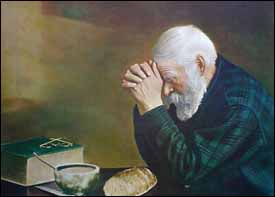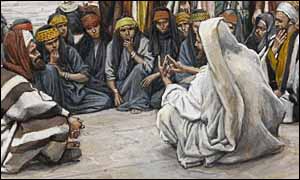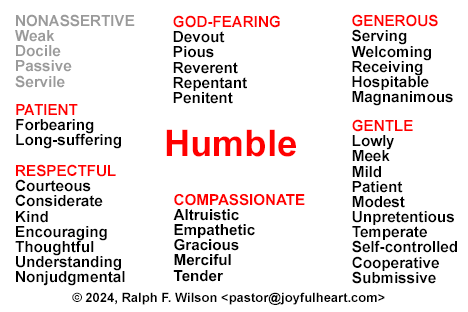Free E-Mail
Bible Studies
Beginning the Journey (for new Christians). en Español
Old Testament
Abraham
Jacob
Moses
Joshua
Gideon
David, Life of
Elijah
Psalms
Solomon
Songs of Ascent (Ps 120-135)
Isaiah
Advent/Messianic Scriptures
Daniel
Rebuild & Renew: Post-Exilic Books
Gospels
Christmas Incarnation
(Mt, Lk)
Sermon on the Mount
(Mt 5-7)
Mark
Luke's
Gospel
John's Gospel
7 Last Words of Christ
Parables
Jesus and the Kingdom
Resurrection
Apostle Peter
Acts
The Early Church
(Acts 1-12)
Apostle Paul
(Acts 12-28)
Paul's Epistles
Christ Powered Life (Rom 5-8)
1 Corinthians
2 Corinthians
Galatians
Ephesians
Vision for Church
(Eph)
Philippians
Colossians,
Philemon
1
& 2 Thessalonians
1 & 2 Timothy,
Titus
General Epistles
Hebrews
James
1 Peter
2 Peter, Jude
1, 2, and 3 John
Revelation
Revelation
Conquering Lamb of Revelation
Topical
Glorious Kingdom, The
Grace
Great Prayers
Holy Spirit, Disciple's Guide
Humility
Lamb of God
Listening for God's Voice
Lord's Supper
Names of God
Names of Jesus
Christian Art
About Us
Podcasts
Contact Us
Dr. Wilson's Books
Donations
Watercolors
Sitemap
 Eric Enstrom and Rhoda Nyberg, 'Grace' (1918, 1940s), colorized photo, oil. |
We begin this life as squalling little infants. Everything centers around us. We scream and others jump. Mother is at our beck and call. But soon, gradually -- and sometimes painfully -- we begin to learn we aren't the center of the universe after all.
"Foolishness is bound up1 in the heart of a child." (Proverbs 22:15a, NKJV)
Parental discipline is designed to disrupt this foolishness that the world revolves around us. To teach us that we must play nicely in the sandbox with others. Unfortunately, the foolishness often lives on in the heart of the child, the teenager, the young adult, and even the older adult in the form of pride.
Oh, there is good pride -- pride in others, pride in reaching a level of achievement, as we'll see in a moment -- but it can so easily be warped into a kind of sinful pride that settles into our hearts.
1.1 What Is Humility?
In this study, we're seeking to discern the symptoms of pride more clearly and walk in true humility. But just what is humility?
Humility is generally defined as the quality of being humble, having a modest view of one's own importance. But the word can carry lots of negative baggage.
The ancient Greeks, for example, considered meekness or humility a negative trait, a kind of servile submission. Only when Christianity became widespread did humility come into its own to be considered a genuine virtue, that is, "a commendable quality or trait."2
 Matthias Stom (Flemish painter, 1600-c. 1649),'Old Woman Praying,' oil on canvas; 30 5/8 x 25 1/8 in., Metropolitan Museum of Art, New York. Larger image. |
As I've studied the teachings of Jesus on humility, I see a two-fold understanding of humility. Biblical humility consists of:
- Humbling oneself in submission before God so he, not self, is the center of our lives, combined with
- Humble service of others, especially those in need.
Moral philosophers Nadelhoffer and Wright use non-religious language to describe humility as a low self-focus combined with a high other-focus.3 That terminology gives us some useful handles to talk about humility. As we carefully examine Jesus' teachings on humility, we'll see that the "low self-focus" involves humbling ourselves before God (Lesson 3) and the "high other-focus" involves concern for others and humble service to alleviate their needs (Lesson 4). We'll round out our understanding further from the teachings of Jesus' apostles.
Our goal in this lesson is to understand the basic shape of pride and humility. First, we'll consider selfless love as the core of Christianity. Then we'll look at the meek of the Beatitudes for clues from the Old Testament, and finally consider four passages from Paul that supply some basic parameters to understand humility.
1.2 Selfless Love Is the Central Theme of Christianity
One day a very smart and highly-trained Jewish scholar from Jerusalem, the center of Judaism, tried to expose the ignorance of the Carpenter from the backwater town of Nazareth. He asked Jesus a sophisticated question that would demand a nuanced understanding of the Torah to answer correctly. It was designed as a trick question.
 James J. Tissot, detail of 'Jesus Speaks Near the Treasury' (1886-94), gouache on gray wove paper, Brooklyn Museum, New York. |
"36 'Teacher, which is the greatest commandment in the Law?'
37 Jesus replied: 'Love the Lord
your God with all your heart and with all your soul and with all your mind.'
38
This is the first and greatest commandment.
39 And the second is like it: 'Love your neighbor as yourself.'
40
All the Law and the Prophets hang on these two commandments.'" (Matthew
22:36-40)
Jesus leaves the Torah expert nodding and stroking his beard because Jesus' answer is so profound and obviously correct. For Jesus, the two most basic commands of all are: (1) Love God, and (2) Love your neighbor. (We'll return to this passage in Lesson 2.5).
Let me spin forward now to Jesus' two main teachings on humility and see how these relate to love. As we'll see in Lessons 3 and 4, Jesus has two primary teachings on humility, and these corresponded to the greatest commandments.
| Love God | Humble yourself before God and he will exalt you. |
| Love your neighbor | The greatest disciple is the one who humbly serves others. |
It is no mystery that selfless agapē love lies at the very center of God, that his Kingdom is very closely related to humility. Humility is love's cousin. We can't learn to love without humility because the two are so closely bound together.
Micah put these elements together centuries before Christ.
"He has showed you, O man, what is good.
And what does the Lord require of
you?
To act justly and to love mercy
and to walk humbly with your God." (Micah 6:8)
Walking humbly with our God, of course, is humbling ourselves before God. Acting justly and loving mercy are respecting and showing concern for our neighbors, humble service of others. Humility, as we'll see, is central.
One important part of this series of lessons are four or five Discussion Questions in each lesson. We learn by reflecting on what we have studied, processing it, and thinking through its implications. Don't skip this step, or you will have gained head knowledge without heart knowledge! I encourage you to write out your own answer to each question, perhaps in a journal. If you are studying with others, discuss it. If you are studying online, click on the web address (URL) following the question and read others' answers or post your own. (Note: You'll need to register on the Forum before you can post your own answers. https://www.joyfulheart.com/forums/instructions.htm)
Q1. (Matthew 22:36-40) How does a two-part definition of
humility correspond to the two greatest commandments? In what sense is humility
"a low self-focus combined with a high other-focus"? What does
that look like in a disciple?
https://www.joyfulheart.com/forums/topic/2270-q1-low-self-focus/
1.3 Blessed Are the Meek (Matthew 5:3-10; Psalm 37)
We've begun to look at New Testament humility. Who then, are the meek of the Old Testament? To get a handle on that, we turn to Jesus' Sermon on the Mount.
The Beatitudes (Matthew 5:3-10)
 James J. Tissot, 'The Sermon of the Beatitudes' (1886-94), gouache on gray wove paper, Brooklyn Museum, New York. |
As we'll see in a moment, the Beatitudes (or Blessings) form a bridge between the Old Testament psalmists and prophets and the Kingdom of God that Jesus is ushering in.
"3 Blessed are the poor in spirit,
for theirs is the kingdom of heaven.
4 Blessed are those who mourn,
for they will be comforted.
5 Blessed are the meek,
for they will inherit the earth.
6 Blessed are those who hunger and thirst for righteousness,
for they will be filled.
7 Blessed are the merciful,
for they will be shown mercy.
8 Blessed are the pure in heart,
for they will see God.
9 Blessed are the peacemakers,
for they will be called sons of God.
10 Blessed are those who are persecuted because of righteousness,
for theirs is the kingdom of heaven." (Matthew 5:3-10)
If we try to carefully parse each individual Beatitude and compare it to the others, we can get confused. For example, if we try to distinguish the "poor in spirit" from the "merciful" or "meek," we miss the point. Consider this: All these terms describe traits of the humble followers of the Lord. What's more, all of these traits are closely related to humility. (We'll come back to the Beatitudes again in Lesson 3.7.)
Psalm 37 as a Precursor of the Beatitudes
When you read Psalm 37 -- as Jesus often did -- you see some of the roots of the Beatitudes. I've picked out a few.
"Those who hope in the Lord will inherit the land." (verse 9)
"The meek will inherit the land." (verse 11)
"Those the Lord blesses will inherit the land." (verse 27)
"The righteous will inherit the land
and dwell in it forever." (verse 29)
"Wait for the Lord,
and keep his way.
He will exalt you to inherit the land." (verse 34)
"Consider the blameless, observe the upright;
there is a future for the man of peace." (verse 37)
Who inherits the land or earth? Not just the meek (verse 11), but also those who patiently hope in the Lord, the righteous, etc. These are traits shared by the humble people of God.
Throughout Psalm 37, the "wicked" are contrasted with "those who hope in the Lord,"4 "the meek,"5 "the righteous,"6 "the poor and needy, whose ways are upright,"7 "the blameless,"8 "the just, his faithful ones,"9 and "the man of peace."10 God's people are described in various ways, but they are the same people. The meek, the poor and needy, the upright, the peacemakers, those who hope in the Lord of the Old Testament set the pattern for the humble, gentle followers of Jesus Messiah and the Kingdom he is ushering in.
The "poor in spirit" are the "poor/meek" of the Psalms "who, while they do experience material poverty, are also, and primarily, presented as God's faithful people, humbly dependent on his protection in the face of the oppression which they endure from the ungodly rich."11 There is a rich tradition in Psalms and Isaiah, of promises to the crushed and humbled who are the true believers in Yahweh.12
Jesus sees his mission to exalt these poor and humble. In the synagogue in Nazareth, he read from Isaiah 61:1-3 what was essentially his mission:
"The Spirit of the Sovereign Lord is on me,
because the Lord has anointed me
to preach good news to the poor.13
He has sent me to bind up the brokenhearted,14
to proclaim freedom for the captives
and release from darkness for the
prisoners." (Isaiah 61:1)
The heirs of the Kingdom, Jesus says, are not primarily the righteous, powerful religious leaders prominent in Jewish society. They are the poor in spirit. Those who aren't puffed up with their own spiritual superiority are the real possessors of the kingdom. The spiritual zeroes, those who have struggled with life and have come up short, they are the heirs of the kingdom.
A physician doesn't come to make the healthy well, but for those who are sick (Matthew 9:12). Jesus comes for those who are aware of their own spiritual need and are hungry for God.
The Arrogant vs. the Lowly
Let's go a bit further. The "humble" are contrasted with the "proud" in the Old Testament in dozens of passages. For example:
"Though the Lord is on high, he looks upon the
lowly,
but the proud he knows from afar." (Psalm 138:6)
"He mocks proud mockers
but gives grace to
the humble." (Proverbs 3:34)
"The arrogance of man will be brought
low
and the pride of men humbled;
the Lord alone will be exalted in that day." (Isaiah 2:17; also vss. 11-12)
We also see this contrast in Mary's Magnificat:
"He has performed mighty deeds with his arm;
he has scattered those who are proud15
in their inmost thoughts.
He has brought down rulers from their thrones
but has lifted up the
humble.16
He has filled the hungry with good things
but has sent the rich away empty." (Luke 1:51-53)
To summarize, the Beatitudes form a bridge between the humble servants of God in the Old Testament and those who follow Jesus in the New Testament. The Beatitudes also illustrate that humility is more than one single trait, such as "meekness." As we'll see, humility involves a whole cluster of traits that characterize those who will inherit the earth.
1.4 What True Humility Is Not
Humility has sometimes been distorted into self-abasement, self-denigration, even self-loathing, or weakness, lack of courage, non-assertiveness, low self-esteem, and servile submission (see Appendix 4. Employing Self-Harm to Humble Oneself). To clarify what we mean by true biblical humility, let me confront some of these wrong views head on. Later in this lesson, we'll flesh out from Scripture what authentic biblical humility looks like.
1. Meekness Is Not Weakness
The world sometimes considers weakness as wimpy. Blessed are the wimpy, for they will inherit the earth? I don't think so.
The word translated "meek" is Greek praus, meaning "'pertaining to not being overly impressed by a sense of one's self-importance, gentle, humble, considerate, meek' in the older favorable sense."17 We'll come across this word again and again. In the Bible, the meek are not the weak and docile, but the ones who endure oppression and persecution and still stand in faith. They are the rugged, persevering humble saints of God.18 They are tough!
2. Humility Is Not Timid, Passive, or Servile
The phrase "Meek as a mouse" is heard often enough to identify meekness with timidity and fear, with running from challenge. The word "milquetoast" describes "a timid, meek, or unassertive person."19 This describes neither Moses or Jesus, nor the disciples Jesus is laboring to form. Jesus is not passive.
Merriam-Webester includes this definition for "meek" -- "deficient in spirit and courage; submissive."20 That doesn't fit the saints of God who lack neither courage nor spirit. Yes, they are submissive rather than rebellious, but that's not because they lack courage. They are compliant because they are willing to work with others without insisting on their own way, but they are not servile, doormat people who invite others to victimize them and walk all over them (see Lesson 6.5).
Humility is not at odds with assertiveness (see Lesson 5.2). Humility has a realistic view of one's self, but doesn't focus on self. Assertiveness, on the other hand is the ability to express your needs and opinions in a clear and direct way.
3. Humility Doesn't Require Self-Abasement or Low Self-Esteem
Some dictionary definitions see humility as "having a lowly opinion of oneself"21 or "of little worth, unimportant ... having a sense of insignificance, unworthiness, dependence, or sinfulness."22 No. Biblical humility -- and that is what we are concerned with -- doesn't require self-abasement. (See also Lesson 1.6.4 below.)
In fact, running yourself down all the time so others will say, "Not true, not true," is a kind of false humility, a way of getting people to affirm you. Yes, Paul affirms that he was the chief of sinners because he persecuted God's people. But that isn't his self-image. He says it to show how far God's very great grace has taken him. Rather, Paul helps us to think of ourselves in powerful ways in place of the old:
"4 Because of his great love for us, God, who is rich in mercy, 5 made us alive with Christ even when we were dead in transgressions -- it is by grace you have been saved. 6 And God raised us up with Christ and seated us with him in the heavenly realms in Christ Jesus...." (Ephesians 2:4-6)
In Christ we are fully blessed.
The person who has low self-esteem isn't humble in biblical terms. Rather he or she needs to understand just how "fearfully and wonderfully made"23 we are in Christ.
1.5 Character Traits that Orbit around Humility
 Moons of Jupiter. Copyright free image from NASA. |
The more I've studied humility in the Bible, the more I've come to see that humility is a central root from which spring various related virtues. They don't usually come separately; they are found together for reasons I'll explain. My mental image of these virtues that cluster around humility is something like the 95+ moons that orbit around the planet Saturn and are held by its gravitational field.24
Let me illustrate this phenomenon by viewing a list of virtues as Paul exhorts the Colossian Church:
"12 Therefore, as God's chosen people, holy and dearly loved, clothe yourselves with compassion, kindness, humility, gentleness and patience. 13 Bear with each other and forgive whatever grievances25 you may have against one another. Forgive as the Lord forgave you. 14 And over all these virtues put on love, which binds them all together in perfect unity." (Colossians 3:12-14).
 Character traits that cluster around humility. You'll notice that some are grayed out. This because traits of passivity, non-assertiveness, and servile behavior are sometimes falsely ascribed to humility (Lesson 5.2 and Lesson 6.5). Larger image. |
If you understand humility as a low-self, high-other value system, then humility compels you to care about others and their needs, to treat others with respect and compassion, to put up with others' idiosyncrasies and sins, and be willing to forgive others. As Paul describes characteristics of agapē love in his famous "Love Chapter."
"Love is patient, love is kind.
It does not envy, it does not boast,
it is not proud." (1 Corinthians 13:4)
These character traits that surround love and humility are all linked; they don't come as isolated virtues. Likewise, a set of traits clusters around pride. (See Appendix 5. Character Traits that Cluster around Humility and Pride.)
I could show you numerous lists of virtues and vices in the Bible,26 but you get the point. Virtues tend to cluster around humility; vices tend to cluster around pride. Thus, to understand how to be humble, we need to explore how humility manifests itself in a multitude of ways. Humility is central to an authentic Christian character.
Q2. (Matthew 5:3-10; Colossians 3:10-12). Why do you
think that virtues flow from humility and vices flow from pride? Why are
humility and pride so central to character?
https://www.joyfulheart.com/forums/topic/2271-q2-flow-from-humility/
1.6 Four Basic Insights about Humility
Now let's begin to lay down some basic planks in the floor of our understanding of humility that come from the Apostle Paul.
- Everything we have is a gift from God (1 Corinthians 4:6-7; Deuteronomy 8:18;).
- Humility requires an accurate self-assessment (Romans 12:3-5).
- Humility is compatible with healthy pride (Galatians 6:3-5).
- Humility gives priority to others' concerns (Philippians 2:3-5).
1. Everything We Have Is a Gift (1 Corinthians 4:6-7; Deuteronomy 8:11-18)
When prosperity leads to wealth, we fall under a powerful temptation to become proud -- towards God as well as those around us. This tendency to pride was recognized three millennia ago in the Pentateuch.
"11 Take care lest you forget the Lord your God ... 12 lest, when you have eaten and are full and have built good houses and live in them, 13 and when your herds and flocks multiply and your silver and gold is multiplied and all that you have is multiplied, 14 then your heart be lifted up, and you forget the Lord your God, who brought you out of the land of Egypt...." (Deuteronomy 8:11-14)
A heart "lifted up" is a way of describing pride. It is very easy to forget and to become ungrateful.
"17 You may say to yourself, 'My power and the strength of my hands have produced this wealth for me.' 18 But remember the Lord your God, for it is he who gives you the ability to produce wealth." (Deuteronomy 8:17-18a)
There is the human tendency after a period of time to forget about God's gifts to us of resources and abilities, so that we come to think of ourselves as self-made individuals. This is also often the case when we inherit wealth rather than earn it for ourselves.
Paul talks about this in the context of a people in Corinth preferring Apollos over Paul:
"We have no cause to boast about anything! What do you have that you did not receive? And if you did receive it, why do you boast as though you did not?" (1 Corinthians 4:7)
The simple point here is that none of us has cause for pride, since whatever we are and have are given to us by God. Our race, national origin, the home we were brought up in, our talents and spiritual gifts, our aptitudes, our education, all of it are from God. If you struggled to get an education, praise God, "Remember the Lord your God, for it is he who gives you the ability to produce wealth" (Deuteronomy 8:18).
Understanding that all we have is a gift is a key underpinning of humility. Don't think that you're somehow better because you have this or that gift or station in life. Everything we have has been given to us by God who has arranged us as he sees fit.
Q3. (Deuteronomy 8:17-18; 1 Corinthians 4:7) What
happens in our heart when we attribute success to our own strength and
abilities? How does a realization that everything we have is a gift affect our ability
to humble ourselves?
https://www.joyfulheart.com/forums/topic/2272-q3-gods-enabling/
2. Humility Requires an Accurate Self-Assessment (Romans 12:3-5)
If we are to be humble, we need to have an accurate understanding of our strengths and weaknesses -- and accept how God has made us and placed us in his body. Paul teaches:
"3b Do not think of yourself more highly than you ought, but rather think of yourself with sober judgment, in accordance with the measure of faith God has given you. 4 Just as each of us has one body with many members, and these members do not all have the same function, 5 so in Christ we who are many form one body, and each member belongs to all the others." (Romans 12:3-5)
The "sober judgment" we need to exercise is part of humility. The word suggests being sensible, reasonable, prudent -- having your head screwed on straight.27 Humility isn't a pitiful view of ourselves, but a realistic one. Being able to accurately assess our own self -- God's spiritual gifts entrusted to us, natural talents, our obedience, the Spirit's work, etc. -- all these are important in walking with humility.
Paul teaches that each of us is designed to have a particular, unique role in his plan, in the body of Christ (1 Corinthians 12). Understanding our spiritual gifts and our role in the church is important to true humility. More on that in Lesson 7.1. This aspect of humility takes a certain amount of emotional maturity, experience, and time listening to God. Don't be frustrated if you're not sure exactly where you fit. It's a process. Seek God. He will gradually guide you.
An accurate assessment of ourselves is part of walking before him day by day in clear-eyed truth, empowered by the Spirit. Accurate self-assessment is the opposite of "vain conceit" that we'll examine shortly.
Q4. (Romans 12:3-5) Why is an accurate self-assessment
of our spiritual state so important? Why is discovering our spiritual gifts so
important? How might pride and anger arise if we imagine we fit somewhere that
God didn't design us for?
https://www.joyfulheart.com/forums/topic/2273-q4-self-assessment/
3. Humility Is Compatible with Healthy Pride (Galatians 6:3-5)
"3 If anyone thinks he is something when
he is nothing, he deceives28
himself.
4 Each one should test his own actions. Then he can take pride in
himself, without comparing himself to somebody else, 5 for each one
should carry his own load." (Galatians 6:3-5)29
In one way, this passage is similar to Romans 12:3-5, since both mention the importance of an accurate assessment of oneself.
I include the passage here, however, because in it Paul mentions healthy pride.30 As we seek to understand humility, it's important to know that not all pride is evil. There is good, healthy pride.
We parents work hard to get our children toilet-trained and seek to instill in them pride in partial achievements to get them to the place where they don't have "accidents." Children love to hear the words: "Good Job!" "Well done."
There is a healthy pride we can take in developing competency, the ability to meet established standards of behavior and skill. For example, a father can be justly proud when his young daughter learns to tie her own shoes, an achievement of competence that she has been trying to achieve for weeks. C. S. Lewis calls this "warm-hearted admiration."31
To take pleasure in being praised is not, in itself, sinful pride. We are happy to have pleased someone we care about. The daughter takes appropriate pride in now being able to say, "I can do it myself." Parents work for years to train children who can operate competently and independently in the world without constant propping up from their parents.32
Christian psychologist Corine Williams explains,
"Pride, in itself, isn't innately sinful. It's a natural human emotion that can be seen as a healthy sense of self-worth and accomplishment. However, pride becomes a sin when it takes on a different nature -- when it changes from a sense of accomplishment and self-worth into an excessive desire for recognition, a pretentious spirit, and an attitude of self-sufficiency that excludes God."33
Children -- and adults too -- feel good when we do our best. It gives us a sense of acceptance and feeling good about ourselves. This is part of a healthy self-image that is nurtured by love.
As we'll see in Lesson 3.1, the word translated "pride" in the Old Testament is closely related to "lift up, exalt," and the word for "majesty" as it applies to Almighty God. Sinful pride involves exalting ourselves, embracing and projecting an exalted sense of ourselves.
4. Humility Gives Priority to Others' Concerns (Philippians 2:3-5)
There is a fourth key passage that provides an important piece of our understanding of humility.
The church in Philippi was being torn by conflict arising from selfishness. Later in his epistle, Paul even has to rebuke by name a couple of women who are at each other's throat:
"I plead with Euodia and I plead with Syntyche to agree34 with each other in the Lord." (Philippians 4:2)
As Paul teaches humility to this congregation, he points to Christ as the prime example. (We'll consider Philippians 2:5-11 in Lesson 2.6). Paul begins his teaching with these words:
"3 Do nothing out of selfish ambition or vain conceit, but in humility consider others better than yourselves. 4 Each of you should look not only to your own interests, but also to the interests of others." (Philippians 2:3-4)
Bear with me as we look at the elements of these important and difficult verses -- and learn to recognize selfish pride in ourselves.
Recognizing Selfish Pride in Ourselves (Philippians 2:3)
In verse 3, Paul calls out two common kinds of self-centered pride: selfish ambition and vain conceit.
1. Selfish Ambition, eritheia, "selfishness, selfish ambition."35 Ambition itself can be good and valuable (as we'll see in Lesson 5.3), but can become ugly when it pushes forward while stepping on others to achieve its goals, rather than seeking the good of the entire family or the community.
2. Vain conceit. "Vain conceit" (NIV), "vain-glory" (KJV), and "conceit" (NRSV, ESV) is the noun kenodoxia, "a vain or exaggerated self-evaluation, vanity, conceit, excessive ambition,"36 a compound word from kenos, "empty" and doxa, "glory." Vain conceit is the opposite of the accurate self-assessment needed for humility.
Selfishness lies at the heart of our human fallenness. How many wars have been fought over a leader's ambition for glory? Or a king's injured pride? Recognizing our vulnerability to being selfish -- either open or hidden to us -- is the beginning of humility.
Surrender to Christ
Selfishness is bad, but not self. Self is just us, our inner person. But self is dangerous if it isn't surrendered to Christ.
In the 1950s and early '60s, Bill Bright (1921-2003) developed the "Four Spiritual Laws,"37 a brief but widely-influential evangelistic tract, complete with helpful illustrations to convey key concepts. The final, and perhaps most profound illustration is known as the "chair illustration."
Many times, in a witnessing situation I have drawn the chair illustration on a paper napkin in a restaurant. It consists of a pair of circles, each with a chair in the center. Surrounding the chair are dots, representing various interests and aspects of a person's life. In one circle, "S" or "self" is on the chair or throne with a cross (U) outside the circle. In the other circle, a cross (U) is on the throne, representing Christ on the throne of one's life, with the dots or aspects of one's life relating directly to the throne. The "S" is still in the circle, but now at the foot of the throne.
 'Chair Illustration' from the '4 Spiritual Laws' by Bill Bright, © 1965-2013, CRU. Larger image. |
After you've gone through the 4 Spiritual Laws with a person you're sharing with, you draw or show them this illustration and ask, "Which circle best represents your life?" You remain silent while they self-evaluate. They'll often correctly diagnose their own spiritual condition. Then ask, "Which circle would you like to represent your life?" Now pray silently and wait! This is where repentance and surrender can emerge -- or pride and rebellion reestablish themselves. I've found this a very powerful illustration to help people see the central issue of surrender to Christ in their lives.
If self sits on the throne of my life, I'll be a proud, selfish person, expecting the world to revolve around me. But if Christ is in charge and self is subservient to Christ, order can be restored in my life and I can gradually become a humble person. Now that Christ is in charge, he can begin to instill the fruit of the Spirit in me.
Sam Shoemaker (1893-1963), Episcopalian priest and evangelist, once said, "Give everything you know of yourself to everything you know of God." Profound! As we learn more and grow more, there is more to give!
Acting In Humility (Philippians 2:3b)
We've considered selfishness and vanity. Now, back to our passage.
"Do nothing out of selfish ambition or vain conceit, but in humility consider others better than yourselves." (Philippians 2:3)
"Humility" (NIV, NRSV, ESV) and "lowliness of mind" (KJV) is the Greek noun tapeinophrosynē, "humility, modesty."38 We'll see this noun and the related verb tapeinoō in our study of humility often, since it is one of the core Greek word groups for our topic. As mentioned above, in Greek literature, the word was used in a pejorative sense, "servility, weakness, or a shameful lowliness."39 In the New Testament, however, it is always used in a favorable sense.
Prioritizing Others' Interests (Philippians 2:3b)
"... 3b In humility consider others better than yourselves. 4 Each of you should look not only to your own interests, but also to the interests of others." (Philippians 2:3b-4)
Pride puts self first; humility puts others first. Humility requires us to give others due consideration.
"Better than" (NIV, NRSV, KJV), "more significant than" (ESV) is hyperechō, here, "to surpass in quality or value, be better than, surpass, excel."40 The common translation "better than," however, confuses us. Some of the Church Fathers double down on this approach to what I consider an unhealthy self-abasement.
"Humility is achieved when man thinks that all mankind is superior to him." -- Saint Basilius the Great (d. 378, Cappadocia).
"Humility is to deem all humankind better than you, being certain in your heart that you are more sinful than all." -- St. Antony the Great (d. 356, Egypt).
"The humble man considers all people to be better than he is." -- St. Pachomius (d. 348, Egypt).
"Humility is to be self-despising in everything." -- Mar Isaac (d. 410 AD, Seleucia).[41]
To come to believe that you are inferior to every last person is neither healthy nor honest. Paul gives us a hint toward a proper interpretation in something he says to the Roman Christians:
"Be devoted42
to one another in brotherly love.43
Honor44
one another above45
yourselves." (Romans 12:10, NIV;
Lesson 6.4)
Love cares about others, as does its cousin humility. That doesn't mean we don't take care of ourselves, that we go without appropriate boundaries, or lack healthy self-esteem. No, it means that we prioritize others' needs. "Love your neighbor as yourself" (Mark 12:31). Perhaps this translation catches the idea:
"In humility count others more significant than yourselves." (Philippians 2:3b, ESV)
On the global scale of things, the other person's concerns might turn out to be somewhat petty, but we are to "consider"46 them more important than our own concerns -- at least for now. Pride might respond, "Oh, don't bother me with something that trivial!" Humility answers, "How can I help you?" An attitude of humility is what we're after.
Caring about Others' Needs (Philippians 2:4-5)
"4 Let each of you look47 not only to his own interests, but also to the interests of others. 5 Your attitude should be the same as that of Christ Jesus." (Philippians 2:4-5)
Paul attributes this attitude of care about others' needs to Jesus himself, and then in verses 6-11 outlines how Jesus humbled himself to death on a cross for our sins (see Lesson 2.6).
Paul isn't encouraging us to be busybodies, always prying into others' affairs.48 But rather to care about others' needs over our own.49 Paul's example is his assistant Timothy. Paul says of him later in same chapter,
"20 I have no one else like him,
who takes a genuine interest50
in your welfare.
21 For everyone looks out for his own interests, not those of
Jesus Christ." (Philippians 2:20-21)
Here's the point of Philippians 2:3-5. True humility puts others' needs first, following Christ's example. Paul is giving us Jesus' mindset on humble service (Lesson 4). This mindset views others with humility. We are to see them not as of greater value intrinsically, but that their needs and concerns surpass our own in importance. We must learn to be other-focused rather than self-focused.
Q5. (Philippians 2:2-5) How can we rationally consider
others' concerns more important than our own? Does agapē love for
others make good sense? What does adopting this viewpoint do for humility in
us? What aspects of Christ's example of humbling himself (verses 5-11) should
be instructive for us?
https://www.joyfulheart.com/forums/topic/2274-q5-others-concerns/
 Paperback, PDF, and Kindle formats |
Prayer
Father, take our selfish hearts and recreate them through Christ as Lord. Forgive us our petty pride that is so ugly. Make us pleasing in your sight and a worthy billboard in our world advertising your goodness and grace. In Jesus' name, we pray. Amen.
Lessons for Disciples
We've covered quite a bit of ground so far on our way to understanding humility. Here are some of the basic lessons:
- Humility is generally defined as the quality of being humble, having a modest view of one's own importance. For the ancient Greeks, however, meekness was considered servile behavior.
- Biblical humility can be viewed by moral philosophers as a low self-focus combined with a high other-focus, which corresponds to humbling oneself before God with humble service to those in need.
- Selfless, agapē love is the central theme of Christianity. Humility is a close cousin.
- Loving God corresponds to humbling yourself before God; loving your neighbor corresponds to humble service to those in need.
- The Beatitudes (Matthew 5:3-10) describe a variety of traits of the humble followers of the Lord, with Old Testament roots in Psalm 37 and elsewhere.
- Humility comes with predictable character traits that flow from love and concern for others -- compassion, respect, patience, etc. In a similar manner, a number of character traits flow from pride. Humility is the basis of Christian character that flows from it.
- Everything we have is from God (Deuteronomy 8:18; 1 Corinthians 4:6-7). Since everything we are and have has been given to us by God, we have no cause for boasting that we are somehow better than others. We don't boast over a gift.
- Humility involves an accurate estimation of ourselves and an understanding of how God has formed us to function in his world and his body (Romans 12:3-5).
- There is a healthy pride we can take in developing competency, the ability to meet established standards of behavior and skill (Galatians 6:3-5).
- Humility places a priority on others' concerns (Philippians 2:3-4).
- We put self in its appropriate place by surrendering "the throne of our lives" to Christ, with self at the foot of the throne (in the terms of the "chair illustration"). Now Christ can order our life properly and instill in us the fruit of the Spirit.
End Notes
[1] "Bound up" is the Qal participle of qāshar, "'bind' ... Basically this root denotes binding or tying something to something (Leonard J. Coppes, TWOT #2090).
[2] Virtue, Merriam-Webster.com Dictionary, definition 4.
[3] Thomas Nadelhoffer and Jennifer Cole Wright, "The Twin Dimensions of the Virtue of Humility: Low Self-Focus and High Other-Focus," Moral Philosophy, Vol. 5, Virtue and Character, Walter Sinnoff-Armstrong and Chiristian B. Miller (eds.), (MIT Press, 2017), p. 310. What their secular definition leaves out is a low self-focus combined with a high God-focus.
[4] Verse 9.
[5] Verses 10-11.
[6] Verses 12, 16-17, 33, 39-40.
[7] Verse 14.
[8] Verses 18-20.
[9] Verses 28-29.
[10] Verses 37-38.
[11] France, Matthew, pp. 165-165. Hill (Matthew, pp. 110-111) says, "The 'poor in spirit' are neither the 'poor in courage' (i.e. in 'spiritedness'), nor 'in the Holy Spirit,' nor 'in spiritual awareness'; they are the 'anâwîm of the Old Testament -- those who, because of long economic and social distress have confidence only in God (cf. Psalm 69:32-33; 37:14; 40:18; Isaiah 61:1)." "Poor" is ptōchos, "pertaining to being economically disadvantaged, poor" (BDAG 896, 3).
[12] Psalm 34:18; 147:3; Isaiah 57:15; 66:2b.
[13] "Poor" is ʿānāw, "humble," from ʿānâ, "afflict, oppress, humble." "The primary meaning of ʿānâ is 'to force,' or 'to try to force submission,' and 'to punish or inflict pain upon'" (Leonard J. Coppes, TWOT #1652a).
[14] "Brokenhearted" is lev, "heart" with the Niphal participle of shābar, "break, break in pieces" (TWOT #2321).
[15] "Proud" is hyperēthanos, "arrogant, haughty, proud" (BDAG 1033).
[16] "Humble" is tapeinos, "pertaining to being of low social status or to relative inability to cope, lowly, undistinguished, of no account." (BDAG 989, 1), in the sense of Zephaniah 2:3.
[17] Praus, BDAG 861. "Meekness is not to be confused with weakness; the meek are not simply submissive because they lack the resources to be anything else. Meekness is quite compatible with great strength and ability as humans measure strength, but whatever strength or weakness the meek person has is accompanied by humility and a genuine dependence on God" (Morris, Matthew, p. 98).
[18] David Hill, The Gospel of Matthew (New Century Bible Commentary; Eerdmans, 1972), p. 111. "'Meek,' like 'poor in spirit,' speaks not only of those who are in fact disadvantaged and powerless, but also of those whose attitude is not arrogant and oppressive.... They are those who do not throw their weight about. But 'meek,' as well as 'poor,' is used to translate 'anâwîm in the Psalms" (France, Matthew, p. 166).
[19] Merriam-Webster.com Dictionary.
[20] Merriam-Webster.com Dictionary, "meek," definition 2.
[21] Oxford English Dictionary, 1998.
[22] Funk & Wagnalls Standard College Dictionary, 1963.
[23] Psalm 139:14.
[24] "Constellations" is another analogy, but constellations are artificial groupings of stars that are not associated with one another except in the minds of humans who see patterns in the sky at night.
[25] "Grievances" (NIV), "complaint" (NIV, ESV, NRSV), "quarrel" (KJV) is momphē, "blame, (cause for) complaint" (BDAG 657).
[26] Lists of virtues -- Galatians 5:22-23; Philippians 2:1-2; 1 Corinthians 13:4-7; Colossians 3:12; James 3:17; Ephesians 4:2; Titus 3:1-2; 1 Peter 3:8-9. Lists of vices -- Galatians 5:26; Philippians 2:3; Mark 7:20-23; Romans 1:28b-31; 2 Corinthians 12:20; 2 Timothy 3:1-5; 1 Peter 3:8-9.
[27] "Sober judgment" (NIV, ESV, NRSV), "soberly" (KJV) is sōphroneō, "to be prudent, with focus on self-control, be reasonable, sensible, serious, keep one's head" (BDAG 986, 2), from saos, sōs, "of sound" and phrenēs, "mind." Sōphroneō is closely related to sōphronsynē, "self-control." See Lesson 6.3.
[28] "Deceives" is phrenapataō, a Greek word used in Christian writings primarily, "mislead concerning the truth, deceive," from phrēn, "thinking" + apataō, "cheat, deceive, beguile" (BDAG 1065). Used only here in the New Testament.
[29] For a full exposition of this passage see my study Galatians: Discipleship Lessons (JesusWalk Publications, 2012), Lesson 9 (https://www.jesuswalk.com/galatians/9_sowing.htm).
[30] Paul takes pride in his congregations and converts (2 Corinthians 7:14; 1:14; Philippians 2:16; 2 Corinthians 9:2-3), salvation (Romans 2:3; 4.2; 5:3, 11; 9:27; Philippians 3:3; Ephesians 2:9; cf. Hebrews 3:6); "in the Lord" (Jeremiah 9:23-24; 1 Corinthians 1:31b; 2 Corinthians 10:17b); preaching the gospel free of charge (1 Corinthians 9:15-18; 11:10); his apostleship (2 Corinthians 10:12-18; 11:16-12:10); integrity (2 Corinthians 1:12-14).
[31] C. S. Lewis, Mere Christianity (Macmillan, 1943, 1945, 1952), III, 8, "The Great Sin," pp. 97-99.
[32] See Kevin Timpe and Neal A. Tognazzini, "Pride in Christian Philosophy and Theology," in Joseph Adam Carter and Emma C. Gordon (eds.), The Moral Psychology of Pride (London: Rowman & Littlefield, 2017), chapter 12, pp. 211-234. In the PhilArchive.org. https://philarchive.org/archive/TIMPIC
[33] Corine Williams, "Breaking the Chains of Pride: A Path to Humility and Growth" blog in Therapy for Christians, posted 16 Apr 2024 (https://www.therapyforchristians.com/blog/the-sin-of-pride).
[34] "Agree with each other" (NIV), "agree" (ESV), "be of the same mind" (NRSV, KJV) is the verb phroneō, "to have an opinion with regard to something, think, form/hold an opinion, judge," here, with the idea, "think the same thing," that is, "be in agreement, live in harmony" (BDAG 1065, 1).
[35] "Selfish ambition" (NIV, ESV, NRSV), "strife" (KJV), eritheia, derived from erithos, "working for hire, a hireling." It is a rather rare word found in Aristotle, where it denotes a self-seeking pursuit of political office by unfair means. BDAG sees "strife, contentiousness" as a possible definition. "But in all cases 'selfishness, selfish ambition' gives a sense that is just as probable (BDAG 392). Thayer sees its New Testament meaning as "a courting distinction, a desire to put one's self forward, a partisan and factious spirit which does not disdain low arts; partisanship, factiousness" (Thayer 249). "Selfish or fractious ambition," plural, "intrigues, party squabbles" (Liddell-Scott, p. 688, 2). Martin (Philippians, p. 96) suggests the translation "quarrelsomeness," though he acknowledges "that does not quite convey the hint of self-seeking that the word contains." Fee (Philippians, p. 816) says, "Selfish ambition' stands at the heart of human fallenness, where self-interest and self-aggrandizement at the expense of others primarily dictate values and behavior."
[36] Kenodoxia, BDAG 538. Fee (Philippians, p. 187) says, "This word occurs throughout the Greco-Roman world to describe those who think too highly of themselves, not those who might appear to have grounds for 'glory,' but those whose 'glory' is altogether baseless."
[37] "The Four Spiritual Laws," © 1965, Bill Bright Media Foundation and Campus Crusade for Christ.
[38] Tapeinophrosynē, BDAG 989.
[39] Peter T. O'Brien, The Epistle to the Philippians: A Commentary on the Greek Text (New International Greek Testament Commentary; Eerdmans, 1991), p. 180.
[40] Hyperechō, BDAG 1033.
[41] Cited by Stephen Pardue, "Humility: The Mind of Christ, and the Early Church Fathers," Biola University Center for Christian Thought, posted September 21, 2015 (https://cct.biola.edu/humility-mind-of-christ-early-church-fathers/).
[42] "Be devoted" (NIV), "love" (ESV, NRSV), "be kindly affectioned" (KJV) is the adjective philostrogos, "loving dearly" (BDAG 1059), from philos, "love" + storgē, "the mutual love of parents and children."
[43] "Brotherly love" (NIV, KJV), "brotherly affection" (ESV), "mutual affection" (NRSV) is philadelphia, "love of brother/sister," here, affection for a fellow-Christian (BDAG 1055).
[44] "Honor" (NIV), "showing honor" (ESV, NRSV), "honor" (KJV) is timē, "manifestation of esteem, honor, reverence" (BDAG 1005, 2a).
[45] "Above yourselves" (NIV), "outdo" (ESV, NRSV), "Preferring one another" (KJV) is proēgeomai, "go before and show the way." Romans 12:10 is difficult, understood by the versions (Italian, Vulgate, Syriac, Armenian) to mean, "try to outdo one another in showing respect." Others make an association with hēgeisthai = "consider, esteem," and prefer the sense "consider better, esteem more highly" (BDAG 869, 3).
[46] The word translated "consider" (NIV), "esteem" (KJV), "regard" (NRSV), "count" (ESV) is hēgeomai, "to engage in an intellectual process, think, consider, regard," here, "look upon, consider someone or something (as) someone or something" (BDAG 434) I like Fee's explanation of the meaning, to consciously "focus on something or someone, to give it due consideration" (Gordon D. Fee, Paul's Letter to the Philippians (New International Commentary on the New Testament; Eerdmans, 1995), p. 188, fn. 76).
[47] "Look to" in verse 4 is skopeō, "pay careful attention to, look (out) for, notice" (BDAG 931).
[48] 2 Thessalonians 3:11; 1 Timothy 5:13.
[49] "Interests" (NIV, ESV, NRSV), "things" (KJV) here and in verse 21 translate the definite article ho, so "things" (KJV) is accurate, while "interests" is an interpretation. Martin (Philippians, p. 98) suggests that the idea is to consider the gifts others possess, rather than their interests and concerns. He asserts, "The good points and qualities in one's fellow Christians are to be watched for, recognized when they appear, and emulated in our lives. This gives a good sense...." I think he is wrong in light of Philippians 2:20-21, but his viewpoint is possible.
[50] "Genuine interest" (NIV), "genuinely concerned" (ESV, NRSV), "naturally care" (KJV) is two words: (1) gnēsiōs, "sincerely, genuinely" (BDAG 202); and (2) the verb merimnaō, "to attend to, care for, be concerned about" (BDAG 632, 2).
Copyright © 2025, Ralph F. Wilson. <pastor![]() joyfulheart.com> All rights reserved. A single copy of this article is free. Do not put this on a website. See legal, copyright, and reprint information.
joyfulheart.com> All rights reserved. A single copy of this article is free. Do not put this on a website. See legal, copyright, and reprint information.

|

|
In-depth Bible study books
You can purchase one of Dr. Wilson's complete Bible studies in PDF, Kindle, or paperback format -- currently 48 books in the JesusWalk Bible Study Series.
Old Testament- Abraham, Faith of
- Jacob, Life of
- Moses the Reluctant Leader
- Joshua
- Gideon
- David, Life of
- Elijah
- Psalms
- Solomon
- Songs of Ascent (Psalms 120-134)
- Isaiah
- 28 Advent Scriptures (Messianic)
- Daniel
- Rebuild & Renew: Post-Exilic Books
Gospels
- Christmas Incarnation (Mt, Lk)
- Sermon on the Mount (Mt 5-7)
- Luke's Gospel
- John's Gospel
- Seven Last Words of Christ
- Parables
- Jesus and the Kingdom of God
- Resurrection and Easter Faith
- Apostle Peter
Acts
Pauline Epistles
- Romans 5-8 (Christ-Powered Life)
- 1 Corinthians
- 2 Corinthians
- Galatians
- Ephesians
- Philippians
- Colossians, Philemon
- 1 & 2 Thessalonians
- 1 &2 Timothy, Titus
General Epistles
Revelation
Topical
